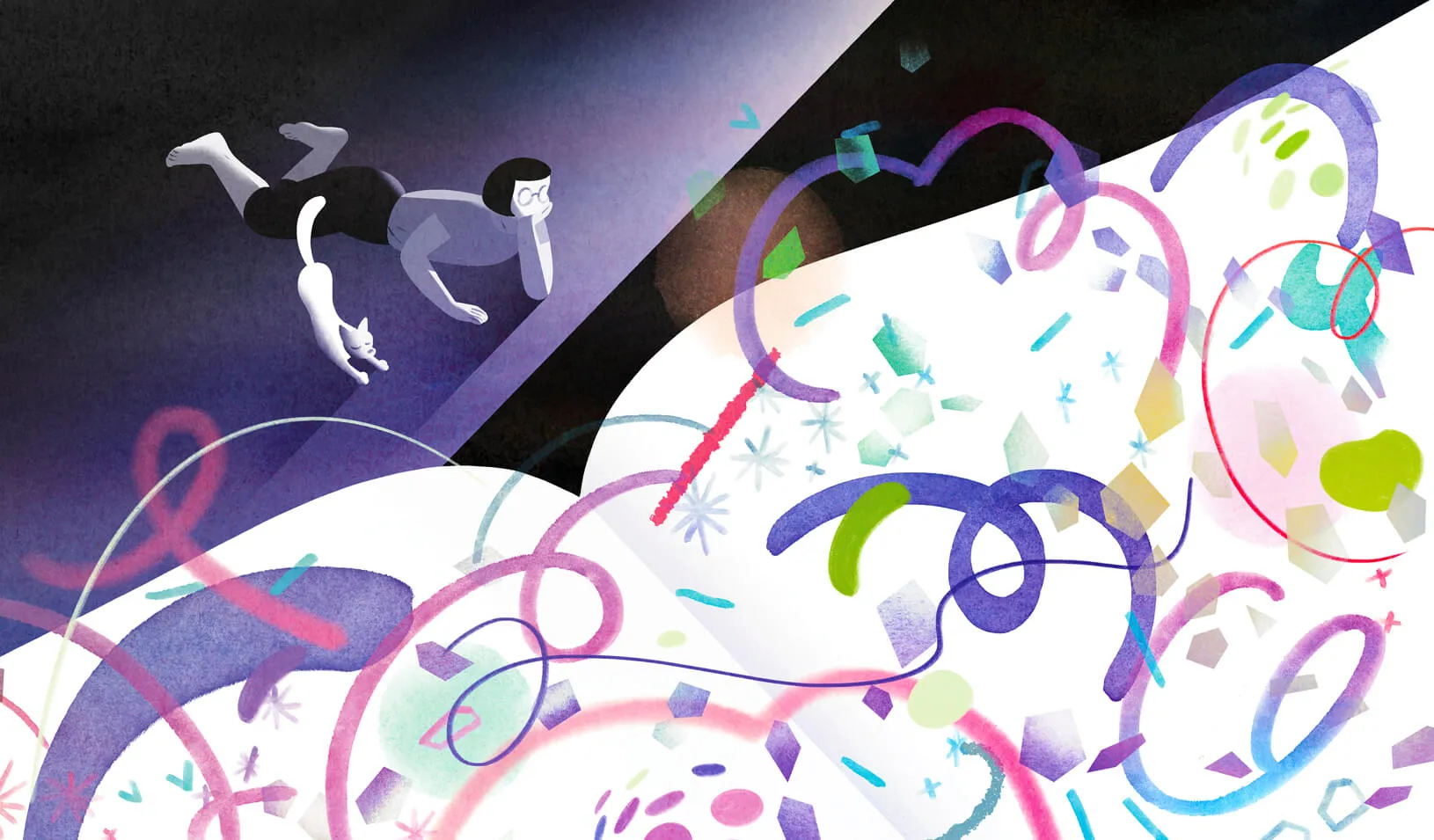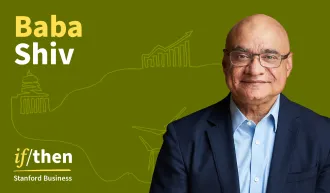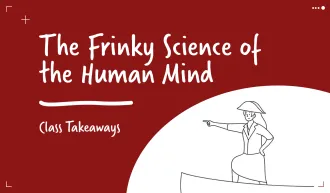Reading Through the Pandemic
A Stanford business scholar discusses the literature that can sustain us in a crisis.
April 23, 2020

In times of global crisis, should we read books filled with optimism and hope or books that look deep into darkness? “All of the above,” says Scotty McLennan. | Illustration by Angie Wang
Scotty McLennan believes great literature is, in many ways, a better way to study business than through case studies, biographies, or history books.
“It helps us get deep into the minds and hearts of people,” says McLennan, who teaches a course at Stanford Graduate School of Business called The Business World: Moral and Spiritual Inquiry Through Literature. “And that’s important during a crisis like COVID-19, because we see the human condition laid bare. We see the character of people and the interaction of all the different forces in society. I think it’s one of the best ways to find help.”
McLennan received both his law degree and his master’s in theology from Harvard in 1975, the same year he was admitted to the Massachusetts Bar and ordained as a Unitarian Universalist minister. He was the dean for religious life at Stanford from 2001 to 2014 and the chaplain at Tufts University from 1984 until 2000. He is currently a lecturer in political economy at Stanford GSB.
Do you think literature offers lessons for people whose personal and professional lives are being upended by the pandemic?
Good literature helps us understand good human relations. It’s valuable through its nuances, its twists and turns, its dilemmas, its paradoxes. It helps us see more than is otherwise seen and focus on what ultimately matters. We’re having to live in a very different way right now, and we’re recognizing the importance of our relationships, the meaning of our work, and how we can come together as a country.
In 2018, you said you were concerned about divisiveness in American culture, and that “we’re not doing a good job of finding common values anymore that we all hold and can be clear about.” Has this pandemic helped or hurt that situation?
It has helped significantly. What ultimately brings people together are positive values such as love and affection and good virtues. And what usually brings those out is a common enemy, which in this case is the virus. United we stand, divided we fall. That’s really clear now. There are some difficult roads ahead, but right now I think can be a unifying time.
Your course uses novels and plays to examine the moral and spiritual aspects of business leadership. What sort of leadership lessons from literature are important to keep in mind during this crisis?
One book I teach in my course is Willa Cather’s O Pioneers! It’s about an entrepreneurial woman in the late 1800s in a hostile environment on the Nebraska prairie. She has a future-oriented way of thinking about how that could become a more rich land that would benefit not only her and the Midwest but the whole country. She exercises substantial leadership to bring people together and does it in the face of resistance from her two brothers, who think a woman can’t really figure this out. But she’s able to envision a future and build a community. She’s good to employees. She’s good across religious and ethnic differences. And she ultimately forgives a guy who kills her brother. She’s a wonderful example of the best of the American spirit and maybe the best of the human spirit.
Any other interesting characters from literature who come to mind as you’ve been watching this crisis unfold?
I love teaching The Great Gatsby, which is set in a very positive, wealthy Jazz Age environment. It’s almost frivolous to think one would teach that during the coronavirus. But as I was preparing to teach it a couple of weeks ago, I realized it was published in 1925 and is set in 1922. That’s just two years after the end of the Spanish flu epidemic, which killed 50 million people worldwide, 30,000 of them in New York City. And although World War I is mentioned, there is nothing in Gatsby about the Spanish flu.
Like it never happened?
How can that not even mentioned in the book? A lot of people apparently felt shame coming out of the Spanish flu, about what they didn’t do to step up and help others at the time. And many people just felt so ravaged by what it had done to their families and communities that they just wanted to forget and move on. It’s important to take two lessons from that. One is hope, because there will be a better day when we look back on this whole era. Second is the question of where we go from here. How are we going to be different and act differently with each other? Gatsby turns out to be a better mirror to these times than I thought.
You’re also teaching Tolstoy’s 1886 novella The Death of Ivan Ilyich, which you argue shows how impending death can be a guide and friend.
The whole idea of terminal illness in the book is about how people around Ivan deal with his dying. At a time like this, death is very much present, and when you understand that I think you live a better and fuller life. You appreciate what really matters. What Ivan needs is love and affection, and nobody is giving it to him. Not his family. Not the doctors. The guy who really steps in is a servant named Gerasim.
Have you seen examples of that during the COVID-19 pandemic?
I’m thinking of all of the unsung heroes who are providing our food, and bagging and delivering our groceries, and all of the nurses and health workers and EMTs out there. Gerasim is taking out Ivan’s bedpan every day and dealing with all of his aches and pains, and he’s happy to help and not afraid of death. He doesn’t find his work a burden.
You’ve said that Henrik Ibsen’s play An Enemy of the People illustrates how, at times like this, virtues such as honesty, integrity, and love come to the fore, as well as vices such as slander and arrogance. Any evidence of that during the current crisis?
Certainly, yes. I see it in the compassion and love coming from people who are not being well paid and are at terrible risk. That’s quite striking, as is the professionalism you see in someone like Dr. Anthony Fauci. There’s also the honesty you see coming from our surgeon general and others who state the medical facts as they are. On the other side, there’s mendacity and lying and dishonesty and slander. So clearly we’re seeing some vices.
Any recommended reading for those who just want to forget COVID-19 for a while?
One is The Bonfire of the Vanities. Tom Wolfe does such a great job satirizing everybody, not just Sherman McCoy, but all the people around him. You’ve got everything — greed, adultery, race, and social issues. It’s almost 700 pages, but it’s so funny and engaging. Only Wolfe can do that. Another would be Crazy Rich Asians by Kevin Kwan. The book is ridiculously insightful with a lot of gossip and hilarious character development. It’ll help get your mind off the current reality. A third is George Bernard Shaw’s Major Barbara, a play about a familial battle over wealth and charity. Shaw makes intellectual and moral and spiritual points all the way through. And finally, Jane Austen’s Emma, which is a delightful 19th–century novel of manners and social status with this very privileged but endearing and self-delusional heroine.
Cormac McCarthy’s The Road is one the bleakest post-apocalyptic novels ever written. It’s extraordinary, but it’s relentlessly dark. I was just wondering if a book like that is a little too dark for right now.
There’s a big issue about literature in times of darkness. Do we want literature that’s optimistic and helpful, or do we want literature that’s more realistic and looks at the heart of darkness that’s always there? I think it’s all of the above and not just one or the other. For example, Albert Camus was an existentialist who saw life as meaningless and absurd, and there’s an emptiness that comes through in his novel The Plague. But that book also has a positive dimension in terms of how the best of humanity comes through as people care for each other in surprising ways. The way to deal with the plague is to do it together.
Once this is all over and post-apocalyptic scenarios seem like fiction again, what novels can you recommend that might help us all put this into perspective?
I’ve have to read The Plague again to see if that does the trick, but I recommend any book that helps us see people at their best, that highlight the kind of people who will come out a situation like this without the kind of shame that was present after the Spanish flu. We need to raise up the hero stories of people who’ve done well in the face of this.
Books that echo that famous quote from Mister Rogers about looking for the helpers in the wake of disasters.
Absolutely.
For media inquiries, visit the Newsroom.
Explore More

Unlocking the “Iron Cage” of Corporate Conformity

The Function of Friction: How to Use Obstacles to Your Advantage



